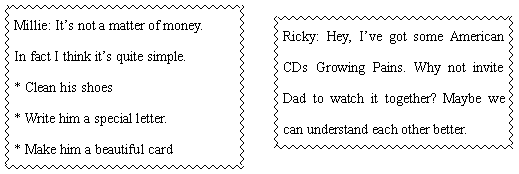题目内容
Some people have very good memories and can easily learn quite long poem(诗歌)by heart. Some people have 51 memories and can only 52 things that they have said again and again.
The 53 English writer Charles Dickens said that he could walk down 54 street in London and then tell you the name of every shop on 55 sides of the street. Great men in the world have wonderful memories.
A good memory is a great help in learning a language. Everybody learns 56 language by remembering what he hears 57 he is a small child. Some children live with their parents in foreign countries and they seem 58 two languages as 59 as one. In school it is not so easy to learn foreign languages 60 students have little time 61 it and they are busy with other subjects as well.
A man’s mind is quite like a camera but it 62 photos of what we see and it can also take photos of what we feel, hear, smell and taste. When we take a real photo 63 a camera there is much work 64 before the photo is finished and ready to show to our friends. 65 the same way there is much work to do before we can keep a picture forever in our mind.
The 53 English writer Charles Dickens said that he could walk down 54 street in London and then tell you the name of every shop on 55 sides of the street. Great men in the world have wonderful memories.
A good memory is a great help in learning a language. Everybody learns 56 language by remembering what he hears 57 he is a small child. Some children live with their parents in foreign countries and they seem 58 two languages as 59 as one. In school it is not so easy to learn foreign languages 60 students have little time 61 it and they are busy with other subjects as well.
A man’s mind is quite like a camera but it 62 photos of what we see and it can also take photos of what we feel, hear, smell and taste. When we take a real photo 63 a camera there is much work 64 before the photo is finished and ready to show to our friends. 65 the same way there is much work to do before we can keep a picture forever in our mind.
| 小题1: |
|
| 小题2: |
|
| 小题3: |
|
| 小题4: |
|
| 小题5: |
|
| 小题6: |
|
| 小题7: |
|
| 小题8: |
|
| 小题9: |
|
| 小题10: |
|
| 小题11: |
|
| 小题12: |
|
| 小题13: |
|
| 小题14: |
|
| 小题15: |
|
小题1:C
小题1:D
小题1:C
小题1:A
小题1:C
小题1:B
小题1:A
小题1:C
小题1:C
小题1:A
小题1:B
小题1:B
小题1:C
小题1:A
小题1:A
小题1:C 根据第一句可知,有的人记忆力很好,而有的则很差,poor“差的,薄弱的”,故选C。
小题1:D 与记忆力有关的词是remember, 故选D。
小题1:C 英国著名的作家狄更斯.....,故选C。
小题1:A any“任何的”,用于肯定句表示强调任何一个。
小题1:C “路的两边”,即both saids或each/ either said。
小题1:B everyone看作单数,故用his。
小题1:A “当......;在......时候”用when。
小题1:C 在国外生活,学习外语很方便,他们似乎学习两种语言像学习一种那样容易。
小题1:C as easily as one“像学习一种语言那样容易”。
小题1:A 因为在学校没有足够的时间给外语。
小题1:B have time for sth.“有时间做......”。
小题1:B take photos“拍照”。
小题1:C “用......”用介词with。
小题1:A 拍照之前有很多事情要做,用不定式作后置定语,故填to do。
小题1:A “用相同的方法”in the same way。in与way搭配,表示“用......方法”。

练习册系列答案
相关题目

 the 32________ of the cabbages. They are eggs of a
the 32________ of the cabbages. They are eggs of a kind of insect(虫子). They are very beautiful but very bad for cabbages. This afternoon you must 33________ all the eggs on the leaves and kill them. In this way, you will help us have 34________, greener and bigger cabbages.”
kind of insect(虫子). They are very beautiful but very bad for cabbages. This afternoon you must 33________ all the eggs on the leaves and kill them. In this way, you will help us have 34________, greener and bigger cabbages.”